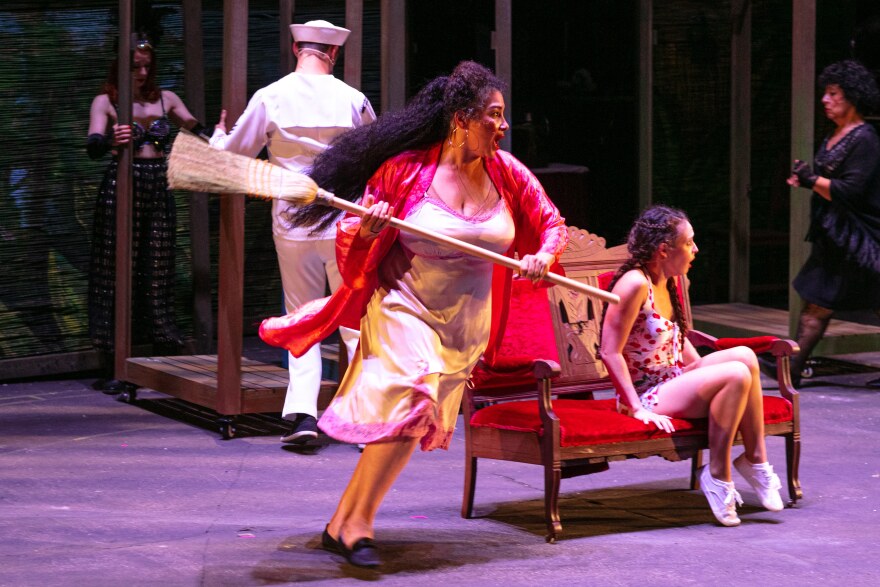When the cast and crew of “The Rose Tattoo” assembled for their first day of rehearsal at the Big Top in Grand Center, stage manager J.M. shouted out basic info about the unconventional venue — like where the audience will be.
“That’s all seating,” J.M. said, pointing at different spots around the cavernous space. “See where the big lift is? That’s not seating, it’s the horse entrance. See where the speaker is? That’s not seating, it’s the goat and people entrance.”
Such details are necessary when producing a Tennessee Williams play in a circus ring that’s 40 feet across, with live music and appearances by two aerialists and a goat named Zest.
The circus-themed production by Tennessee Williams Festival St. Louis, which can be seen at the Big Top through Aug. 28, is more logistically complicated than any other production the festival has attempted.
“This is the most challenging thing I’ve ever done,” festival Executive Artistic Director Carrie Houk said, standing with director David Kaplan under the tent where the concession stand sits, as nearby production workers familiarized themselves with the quirks of the space.
Williams’ comedy tells the story of Serafina Delle Rose, an Italian American seamstress on Louisiana's Gulf Coast. She begins the play as a lusty woman boasting about her love life but becomes a chaste widow carrying around the urn holding her late husband’s ashes. She evolves into a spiritually reborn woman who embraces romance again.
Rayme Cornell stars as Seraphina; Bradley Tejeda portrays her much-younger suitor, Alvaro; Valentina Silva is Seraphina’s teenage daughter, Rosa; and Oliver Bacus plays Rosa’s sailor boyfriend, Jack Hunter.

A logistical challenge
The festival has mounted productions in unconventional locations before: Last year, it produced “The Glass Menagerie” outside a St. Louis apartment building where Williams once lived. But “The Rose Tattoo” gave Houk more than usual to manage. When she started planning for it six years ago, a lot of people questioned her choice of venue.

“Everyone would say, ‘Are you sure you want to rent the tent? Are you sure you want to sign a lease on the Big Top?’” Houk recalled. “Every single person involved in this production, whether it's a designer, actor, musician, director, producer — we've all stepped out of a comfort zone.”
“The Rose Tattoo” includes the largest company for one of the festival’s shows, Houk said. And the large circus ring presents complications for actors and designers.
“That’s a challenge to enlarge the behavior, so it can be seen. That’s a challenge for the microphones, so they can be heard. That’s a challenge for the lighting. That’s a challenge for every aspect of it,” said Kaplan, the play’s director.
Imagination merges with reality
Kaplan’s vision for the show is inspired by the work of Italian film director Federico Fellini, who in his films often drew on the bright colors, loud sounds and the semi-controlled chaos of circuses and carnivals.
“What Fellini teaches us is that our imagination is part of reality,” Kaplan said. “This production is trying to free the play from expectations of realism. It’s meant to give power to Williams’ hope that the play was a dream, and that the audience could dream, too.”

A particular inspiration is Fellini’s 1965 film “Juliet of the Spirits,” about a quiet woman who goes on a surreal journey of self-discovery. The people in her life display exaggerated behavior, and the film’s outdoor settings look deliberately artificial.
“When you watch the movie, what you realize is that Julieta is the only full person in the movie. Everyone else is a fantasy, as seen through Julieta’s eyes,” Kaplan said. “And so Serafina sees the world as if it was a circus. The new love has to break through that and become a person.”
In this production, when Alvaro appears for the first time he wears the red nose of a clown. Characters suddenly appear onstage when Serafina mentions them, then disappear again. Sometimes actors change costume pieces in the middle of a scene, as if to underline the artifice at play.
When Father De Leo, played by Harry Weber, admonishes Serafina not to act like “a wild animal,” he dons the top hat, red coat and whip of a ringmaster.
The fast-moving production includes every word of Williams’ script, while bringing it to life in highly stylized fashion. Kaplan and Houk have fleshed out ideas and traded suggestions about this complicated production for years.
“But I never doubted that we would be here,” Houk said, looking around the grounds of the Big Top. “And here we are!”
Follow Jeremy on Twitter: @jeremydgoodwin





